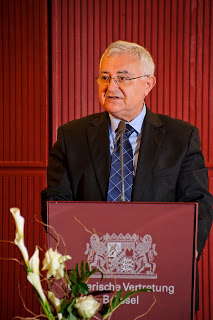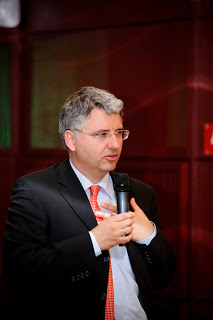Event: The revision of the Clinical Trials Directive with medicinal products — An opportunity for the next 20 years
09.03.12
Dr. Severin Schwan, CEO Roche, John Dalli, Health Commissioner and Dr. Anja Weisgerber, MEP. Credit: Lander Loeckx
A lively and interesting debate organised in partnership with Roche and entitled, The revision of the Clinical Trials Directive with medicinal products — An opportunity for the next 20 years, took place at the Representation of the Free State of Bavaria to the European Union.
The event brought together patients, researchers, industry, authorities and political decisionmakers to discuss how the planned revision of the Clinical Trials Directive could improve the harmonisation of assessment and authorisation in order to enhance access to medicines.
On one hand, welcome speeches were given by Dr. Angelica Schlunk, Director of the Representation of the Free State of Bavaria to the European Union and Dr. Severin Schwan, CEO of Roche. On the other hand, Richard Bergström, Director General of EFPIA was there to close the debate.
The introduction was given by John Dalli, Commissioner for Health and Consumer Policy followed by a panel discussion moderated by Dr.Jeanne Rubner, Bayerischer Rundfunk.
Clinical Trials Directive — Meeting patients’ needs
The panel included Nils Behrndt, Deputy Head of Cabinet at DG SANCO, Dr. Anja Weisgerber, MEP, Prof. Dr. Klaus Cichutek, President of the Paul-Ehrlich Institut, Michael Doherty, Global Head Regulatory Affairs at Roche, Prof. Georg Marckmann, Director of the Institute of Ethics, History and Theory of Medicine, Ludwig-Maximilians-University Munich and Nick Meade, Genetic Alliance UK.

John Dalli, Health Commissioner. Credit: Lander Loeckx
In his speech, Commissioner Dalli called for improving the current system as it is. He acknowledged the fact “clinical trials are crucial for the development of new medicines and they are a key contributor to growth and jobs in the area of public health which investments are worth over €20 billion”.
He stressed out worrying trends saying that there has been a decline in clinical trials in the EU in recent years about 15%, a doubling in the costs for bureaucracy and resource requirements to handle paperwork, and delays have increased by 90%.
“We want to streamline the submission process and create a single submission portal. Information on one clinical trial should be submitted only once”, he said.
“I want an assessment system that is fast, slim, pragmatic, and not disproportionately expensive, complex or bureaucratic. (…) We need a collaborative, flexible approach”.
Each year sees the authorisation of approximately 4400 new clinical trials, and at any point in time, some 1200 clinical trials are ongoing in Europe, he outlined. Of these, 25% are multi-national, taking place in 3 to 5 Member States.
“These figures show that a central bureaucracy would lead to uncompetitive timelines and to inflexible and disproportionately expensive mechanism”.
He also revealed that the Commission was thinking to adopt the revised legislation in the form of a regulation in order to ease its transposition into national laws.
He concluded: “The revision of the Directive is being prepared with the broadest possible involvement of stakeholders with a view to Europe becoming, once again, an attractive place for clinical trials of the highest standards”.
“Small steps are no longer enough to turn things round”
Dr. Severin Schawn, CEO Roche. Credit: Lander Loeckx

Severin Schwan, CEO of Roche, called for some centralisation of the approval process:
“Under the current rules for clinical trials, the requirements for approval by multiple ethics committees are leading to repeated delays and frequent divergences, contributing to the decline in the European Union”.
Roche’s CEO believes clinical trials could gain inefficiency with fewer ethics committees.
To him, “it is essential to keep a centralised option on the table”.
He warned that Europe is losing attractiveness to Asia, US and Latin America and that Europe needs to adapt to market change to keep its competitiveness.
“We need to build a system for Europe: Let’s build a system for the future”
Richard Bergström, EFPIA Director General closing down the debate. Credit: Lander Loeckx.
In his closing remarks, Richard Bersgtröm, EFPIA Director General, agreed on a need of a single portal stressing out that “no-one wants to create a monster agency”.
He warns that discussions around the revision will not be easy and there would be a risk to get lost in all sort of technical details or issues like disclosure of data and clinical trials in third countries.
EFPIA’s Director General, stressed out the need to build a system for Europe and not only to accommodate three to four countries:
“I do not want a system which works for three to four countries, just because that was the average in the past. We need a system for the future that will involve all twenty-seven countries.
What I want is to compete with China, is to compete with the U.S!”
For further information on the revision of the Clinical Trials Directive, visit the European Commission website, here.
Commissioner Dalli’s speech is available here.
